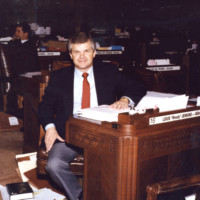
A Stroll through Capitol on Inauguration Day
A stroll through the Capitol on Inauguration Day this past Monday brought back memories, some from long ago.
The State Capitol has been something of a second home for me for the past 56 years. Not only the 28 years I represented Baton Rouge in the Louisiana House of Representatives from 1972 to 2000 but also the eight years before that and the 20 years since.
My first Inauguration Day was in 1964. Gov. John McKeithen was inaugurated for his second term. The new House and Senate were sworn in. Many new legislators arrived to make their mark on Louisiana politics. However, I had eyes for only two of them — new Reps. Morley Hudson and Taylor O’Hearn, the first Republicans elected to the Louisiana Legislature since Reconstruction.
They were two of the finest men I’ve ever known. I served as their legislative page.
Things were very different in 1964. Before 1972, the House operated in what I consider a deplorable fashion. Eating and drinking was allowed on the House floor. By late afternoon, some members often began to drink the hard stuff. A night time session was invariably marked by members’ misbehavior.
Members eating at their desk while debate was going on would throw chicken bones and other food at one another. A veritable food fight! It was unbelievable really, considering the seriousness of the work.
Yet, eating in the Chamber and drinking alcohol were in some ways the least of the problems. Lobbyists were allowed in the rails of the House Chamber. They could sit at a member’s desk and vote his machine for him, even if he were away from the Capitol. Sometimes lobbyists would “handle” 10 or 15 voting machines for absent members, often but not always with their permission. One lobbyist might control a block of votes and other lobbyists might have their own. I often saw Mr. Victor Bussie, president of the Louisiana AFL-CIO, vote over and over for absent members. It was a common, everyday occurrence.
Worst of all was the lack of knowledge by members of what they were voting on. At the beginning of the session, loose leaf binders appeared under each member’s desk. They contained a copy of the original bill of every bill filed during the session. However, after that, members did not received a copy of the engrossed bill containing the House committee amendments. Moreover, floor amendments were not passed out for members to read. If a bill were amended in the Senate, House members never saw the reengrossed bill containing the changes. Members simply relied on the explanation of the author at the mike. Unfortunately, the authors were often mistaken or even lied about the contents.
All of this is difficult to believe today but was absolutely true.
Before 1972, the old ways of the Huey Long era were still alive. Old ways die hard, especially when they are the stock-in-trade of powerful people. Nevertheless, in 1972, things changed suddenly and dramatically at the Capitol. Court-ordered reapportionment into single-member districts resulted in 65 new members of the 105-member
House. I was part of that freshman group, which elected Bubba Henry to be Speaker of the House. We adopted new Rules the first day we were in session, rules that changed the Louisiana House of Representatives — and the Senate — forever.
The first thing we did was end eating and drinking in the House Chamber. The second thing was prohibit lobbyists from coming inside the rails of the House. The third thing was to require that copies of the bills be printed with committee amendments, that floor amendments be printed and passed out, and that Senate amendments to House bills be printed and made available to the members.
At first this was only done for the members who requested it but not long afterwards they were distributed to everyone.
The proposal to expel the lobbyists from the House chamber was bitter and divisive. I cannot remember anything in the legislative process that was more obviously wrong that people, especially organized labor, fought to maintain. They talked, lobbied and threatened, but the House members wouldn’t budge.
In the 56 years I’ve been coming to the Capitol, I believe those reforms in 1972 were the most significant and did more to improve the quality of the decisions made at the Capitol than anything else.
The Constitutional Convention of 1973 came on the heels of the changes by the legislature in 1972. As a result, CC/73 included in its rules all of the procedural changes made by the House. Without question, these reforms enhanced the quality of the decisions made at the convention.
I am very proud to have served in the House and at CC/73 during those historic times. I will always be grateful to the people of Baton Rouge for giving me the chance to represent them for 28 years, longer than anyone has represented the city in the House in state history.
However, I don’t miss being at the legislature everyday. For me, it was a season in life when I learned a great deal and hopefully made a contribution. But there are other challenges in life, and leaving the legislature in 2000 gave me the opportunity to explore many of them!


 January 20, 2020
January 20, 2020 







Comments are closed.